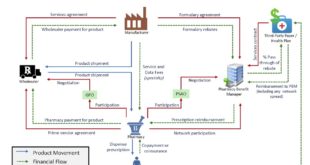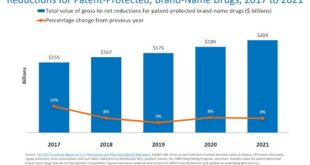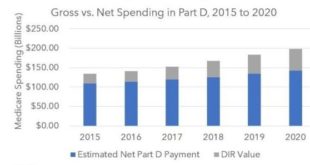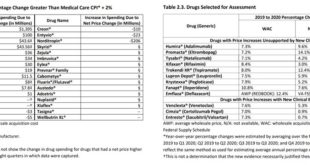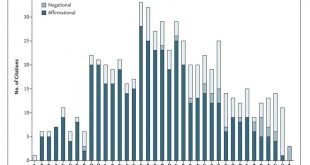This commentary came by way of ltr a reader at Angry Bear. A pretty solid review of how drug prices and the resulting costs after insurance are still impossible to pay. That is, if the insurance, Medicare, Medicaid even pay for them in entirety or a portion. If the former is not the case, a patient is left with what they will not pay. Then there is the yearly deductibles and co-pays. Some will decide not to take these potentially life-saving...
Read More »Prescription Drug Price Increases for 2016 -2022
What I like about this Issue-Brief is the use of terminology we see, not knowing what it means, and seeing a description or definition. I have added links so as to do a deeper dive into the terminology. Carefully read, a person can garner an understanding of initial drug costs, intermediate costs, discounts, and what pricing results to the consumer. It is not pretty and reflects much pricing rent-taking over the last two or so years, blaming...
Read More »Mark Cuban’s Pharmaceutical Cost Plus Company
This post is kind of a commercial. I am detailing another way you may be able to fulfill your pharmaceutical prescriptions. The catch right now is having common drugs. Mark Cuban has said he will add more of he less common drugs as they negotiate with the pharmaceutical companies. I have the United Healthcare – Walgreens plan. They issue a 90-day supply of my generic drugs. Up till this year, they would containerize them properly. These were...
Read More »FTC and Congress Put PBMs on Notice
FTC and Congress Put PBMs on Notice – AAF (americanactionforum.org) The conclusion of the Congressional Plan Much of this post in a copy and past. However, the conclusion is mostly mine. I am starting out with the conclusions and actions of Congress to which the author claims could result in fewer PBMs and increasing prices. If you look at Figure Two, it becomes rather obvious where the fallout is going to be. The smaller PBMs will not be...
Read More »A Look at Drug Pricing 2020, Costs, and Why – “Redux”
Commenter Arne asked how we would transition from today’s healthcare system to a Single Payer format. I do not have the answer immediately at hand. I have to look for it. I do want to review what we have learned to date and stated on Angry Bear already. I do have a number of posts of the costs of healthcare. This one I like as it is simple and gets the point across on Drug Costs. I recently did a post of Pharma pricing which I will conclude with...
Read More »Pharma Gross-to-Net Bubble Exceeds $200 Billion in 2021 (a relationship)
This article by Dr. Adam Fein is drawn from the Drug Channels Institute. I can not say any of my knowledge is found in the detail of this recital. To summarize a bit as you read the detail, increases in rebates are associated with increases in list prices. Insurance coverage, the sale of drugs to distributors, sold to drug stores, via Pharmaceutical Benefit Managers is complex. Dr. Adam Fein explains how it works. He presents a couple of charts...
Read More »Medicare’s $200 billion Gross Drug Spend
Medicare is almost $200 billion in gross drug spend: Who gets the blame? — 46brooklyn Research This is a complex issue as there are many moving parts to drug pricing and their costs. Perplexing in describing the drug spend issues would seem appropriate. I am not even sure if this long post will adequately define the issue of how drug prices are set. However, here is another article which I believe may break this down even more so. Later on...
Read More »What the IRA could mean for PBMs
“What the Inflation Reduction Act means for PBMs” Times of News This is a strange little article trying to fill a gap in knowledge. The italicized sentences are mine. It does make some sound points on PBMs so I kept it. If you can get into Seeking Alpha or Modern Healthcare, you may find a better version. The sweeping law President Joe Biden enacted Tuesday offers relief to some prescription drug users. However, the pharmacy benefit managers...
Read More »Drug price control in the Inflation Reduction Act
Inflation Reduction Act The Inflation Reduction Act drug price negotiation is small in returns, low in the number of drugs initially impacted, and slow to start. Ten drugs will be selected and the impact of the act begins in 2026. It rises to 20 drugs to be negotiated in 2029. The new act ignores European reference pricing and instead caps prices at a set discount of average U.S. prices. The act establishes an initial standard in which the scope...
Read More »U.S. Seeks to Block Bankruptcy Plan That Would Free Sacklers From Opioid Claims
“The Justice Department moved on Thursday to block a bankruptcy plan that grants broad legal immunity to the pharmaceutical company Purdue Pharma, whose drug OxyContin has been at the heart of the nation’s opioid epidemic. William K. Harrington, the U.S. trustee for the Justice Department, filed a motion in federal court to halt confirmation of the settlement while the department appeals the judge’s decision to approve the deal. In writing...
Read More » Heterodox
Heterodox


